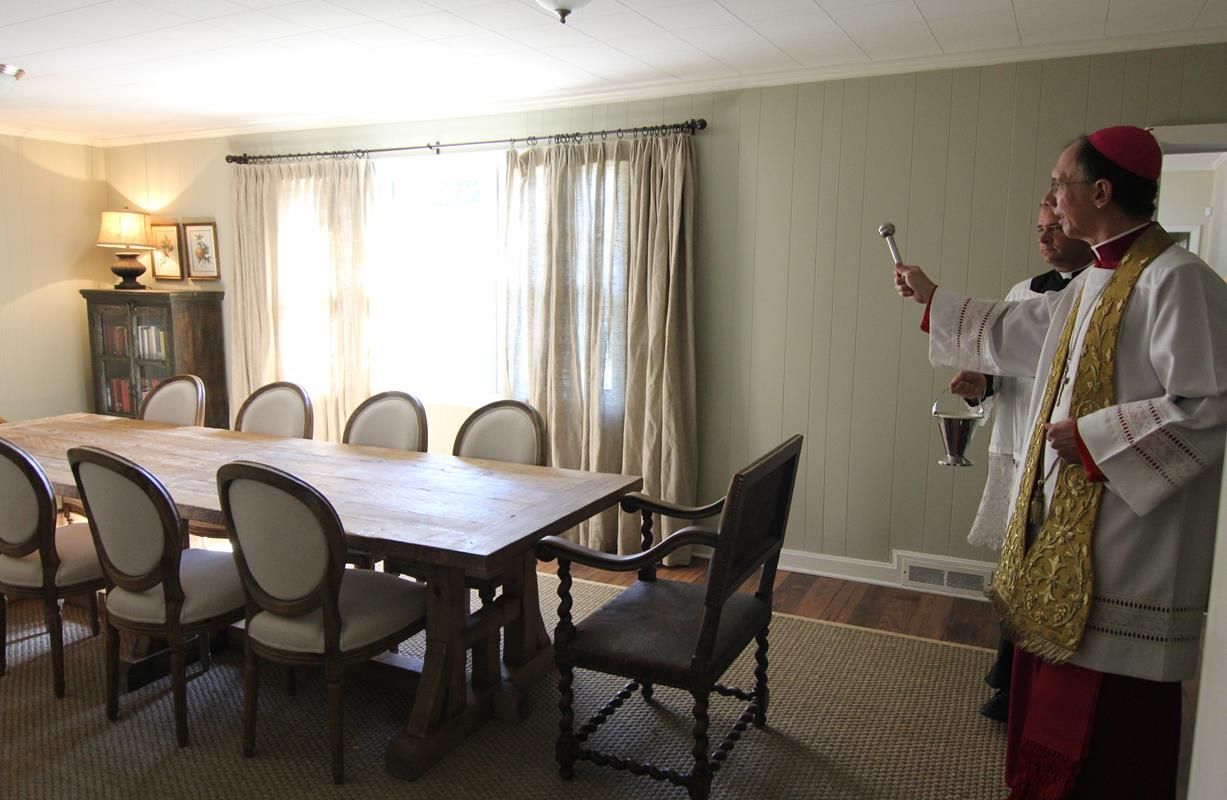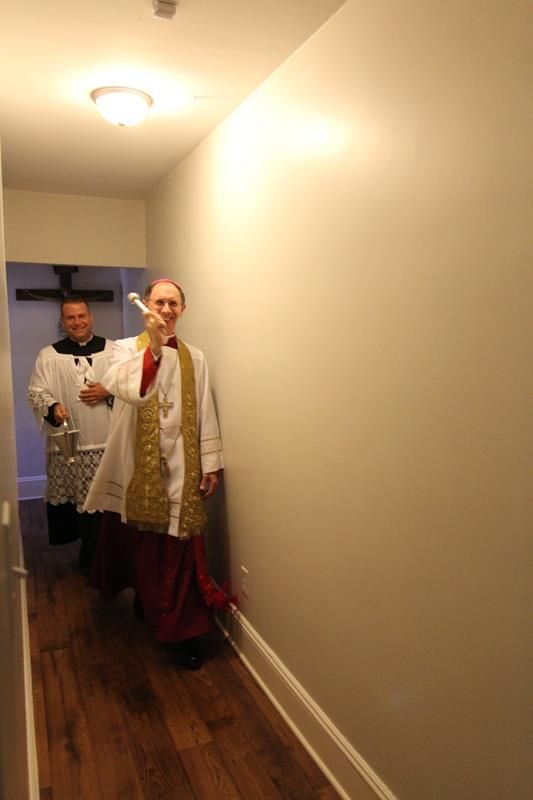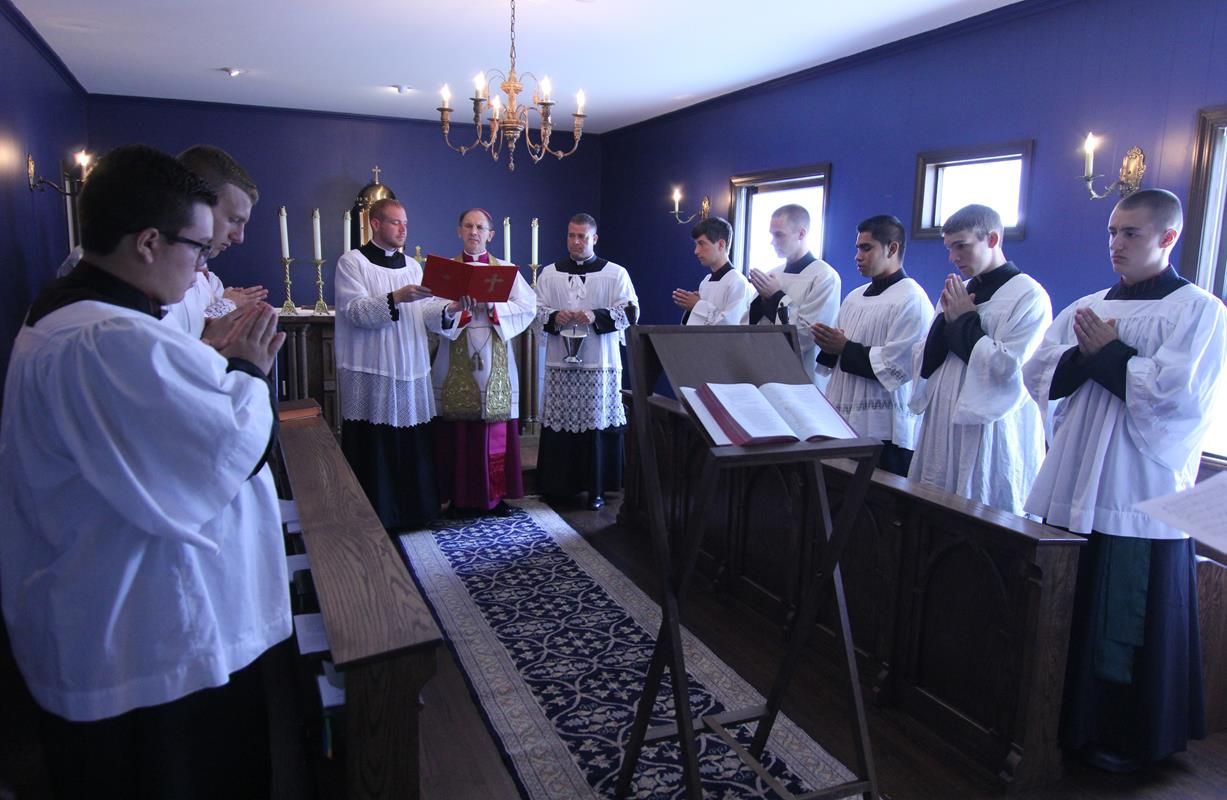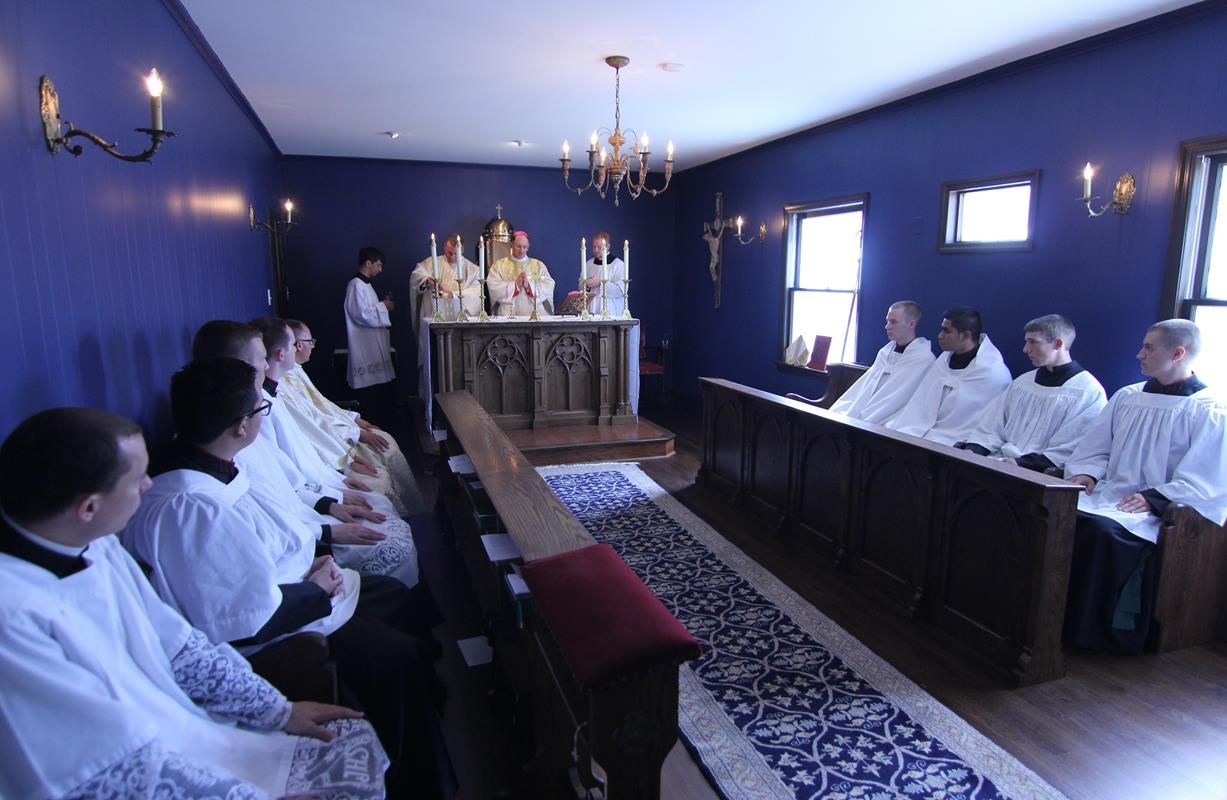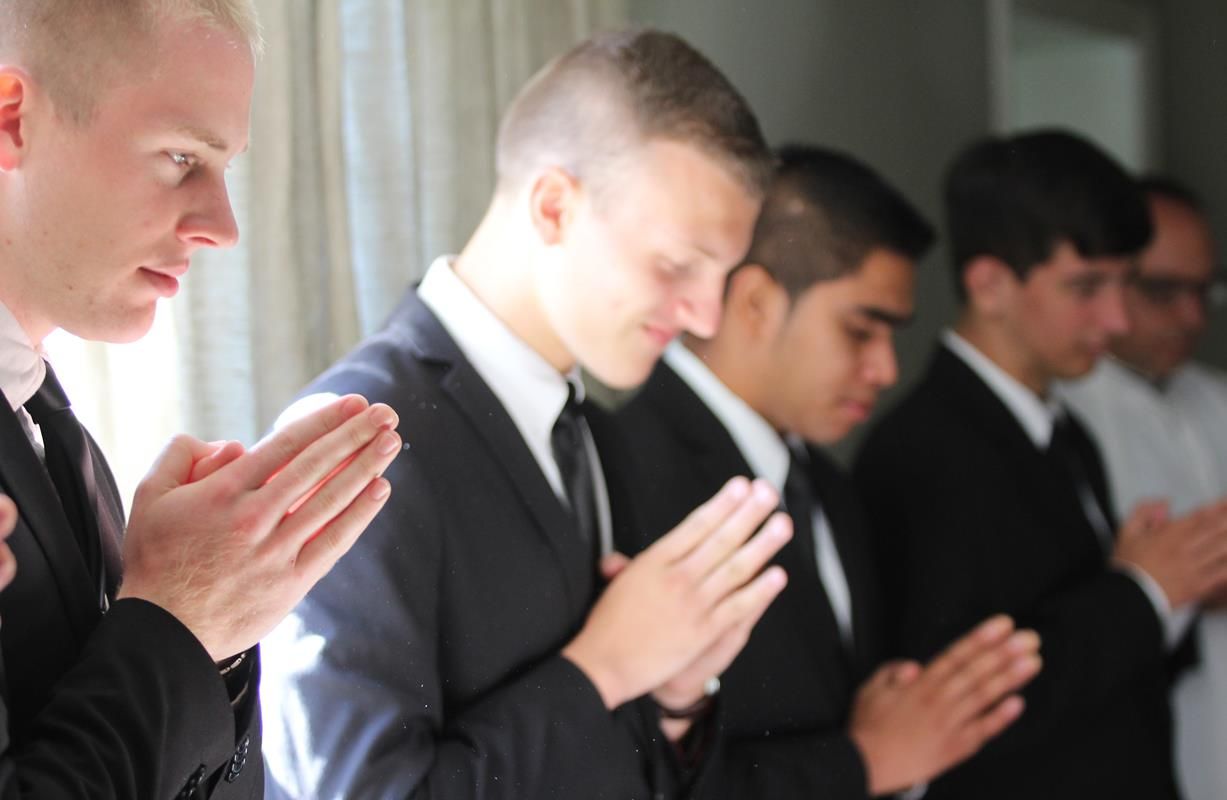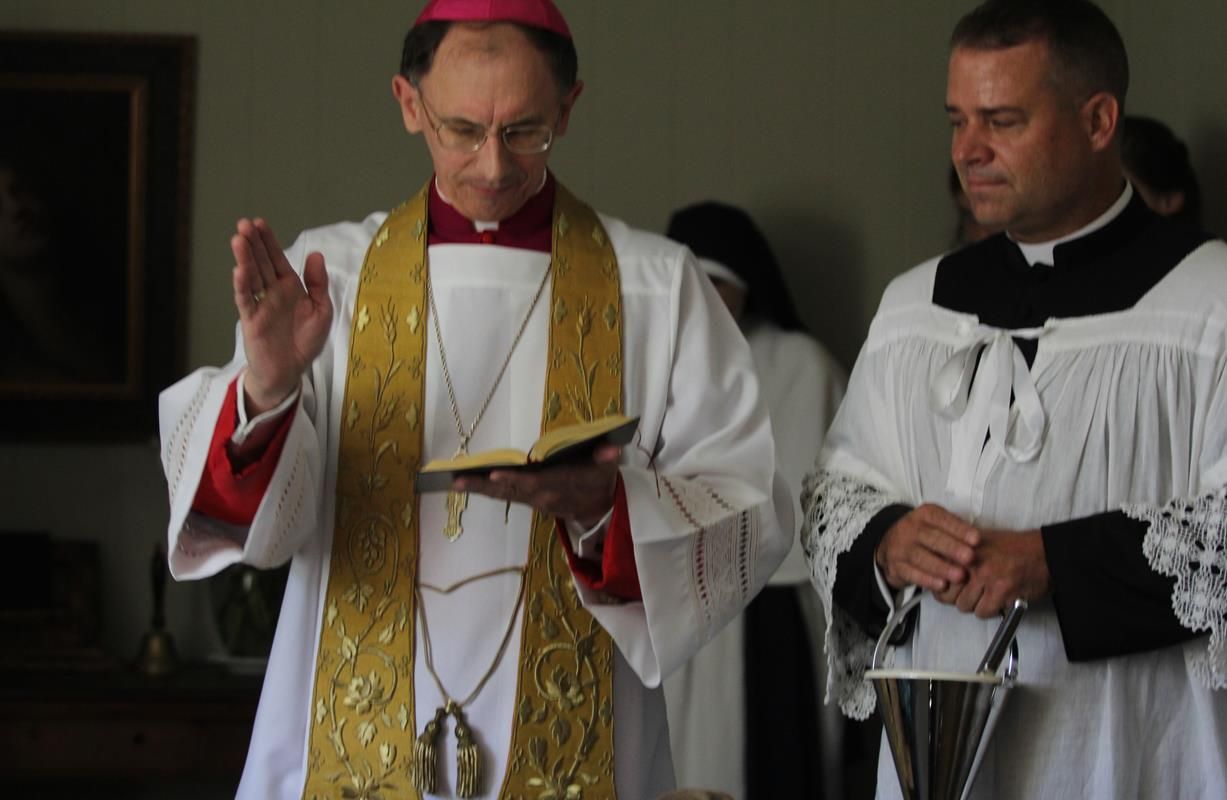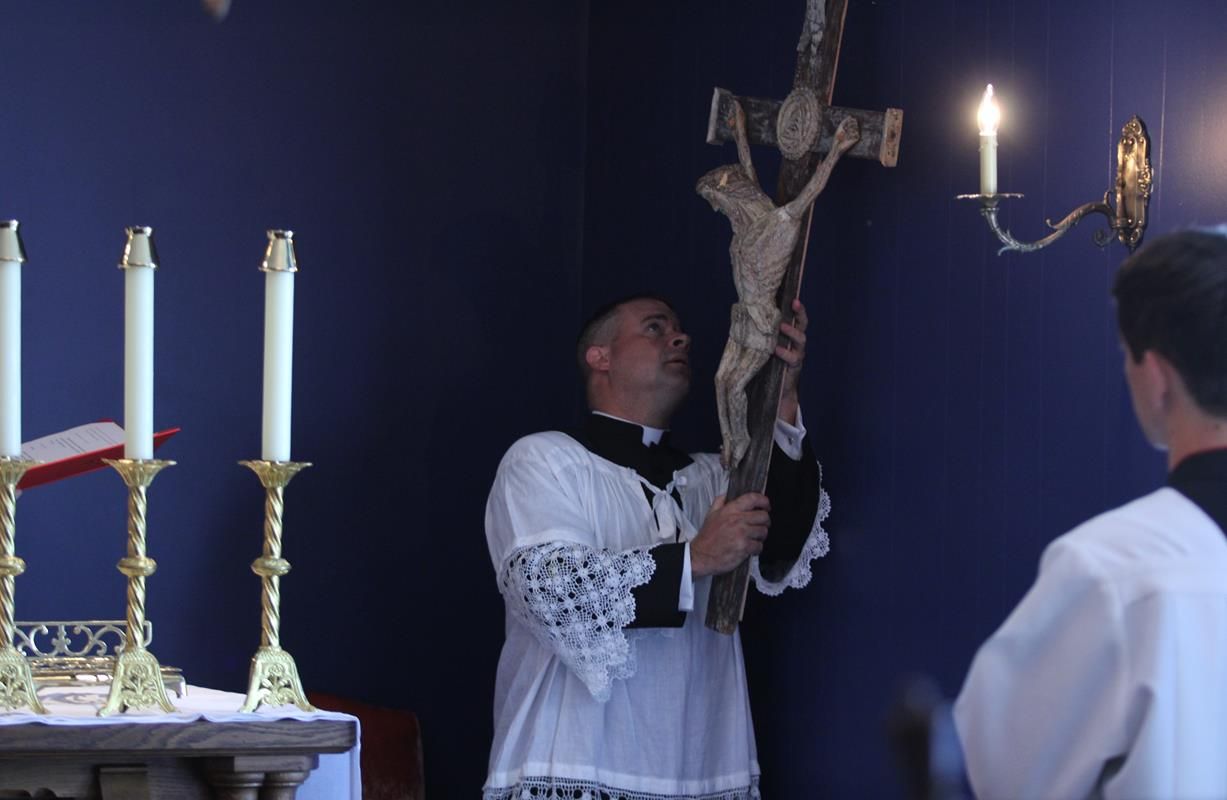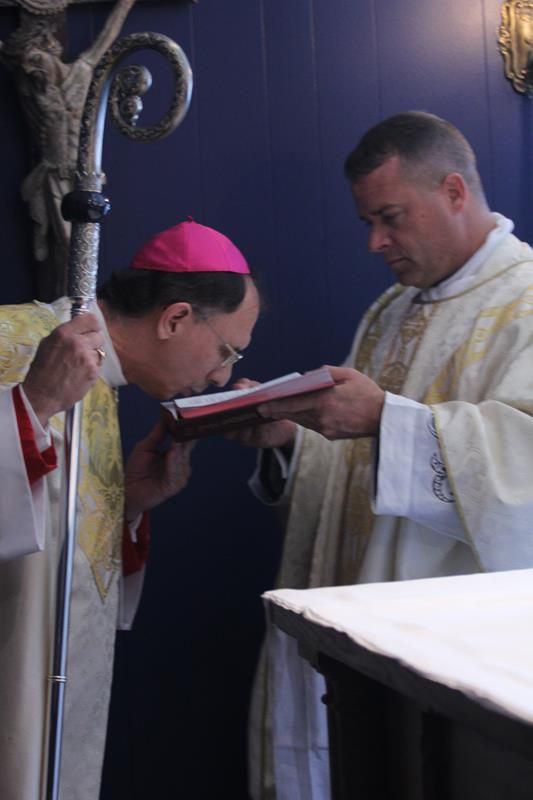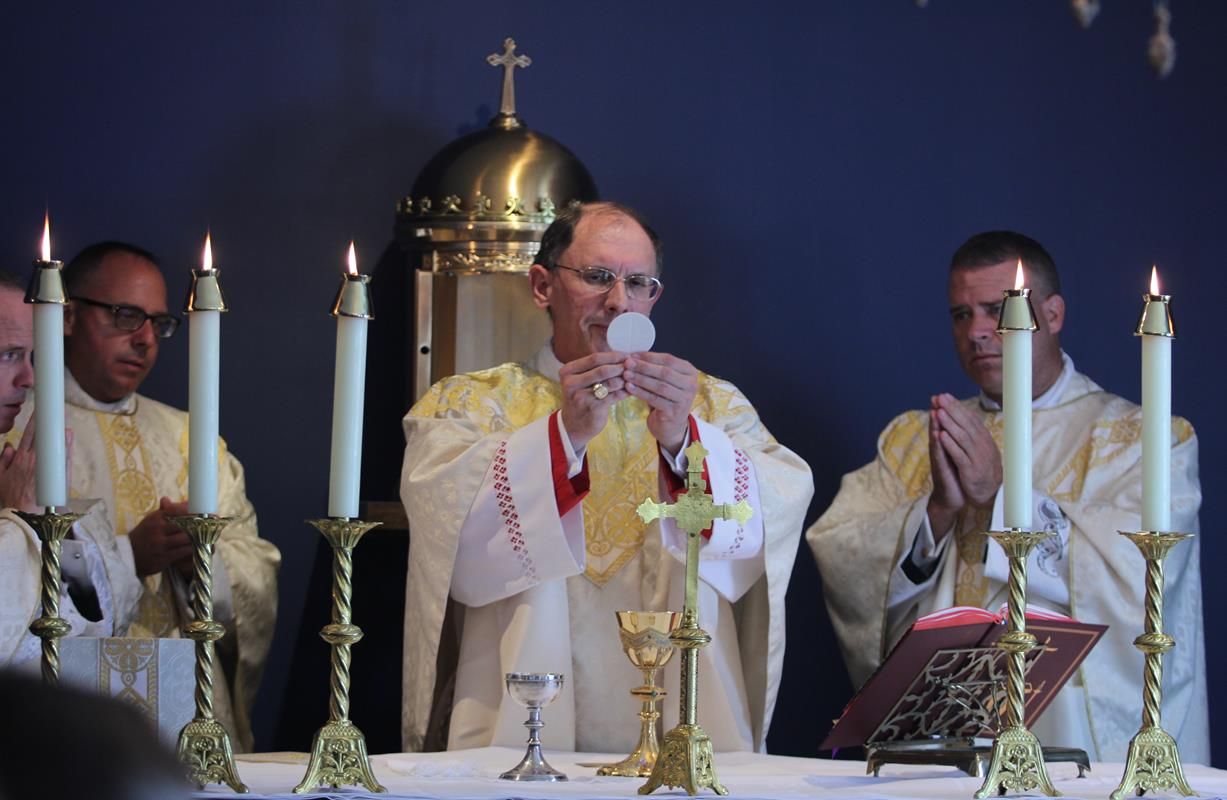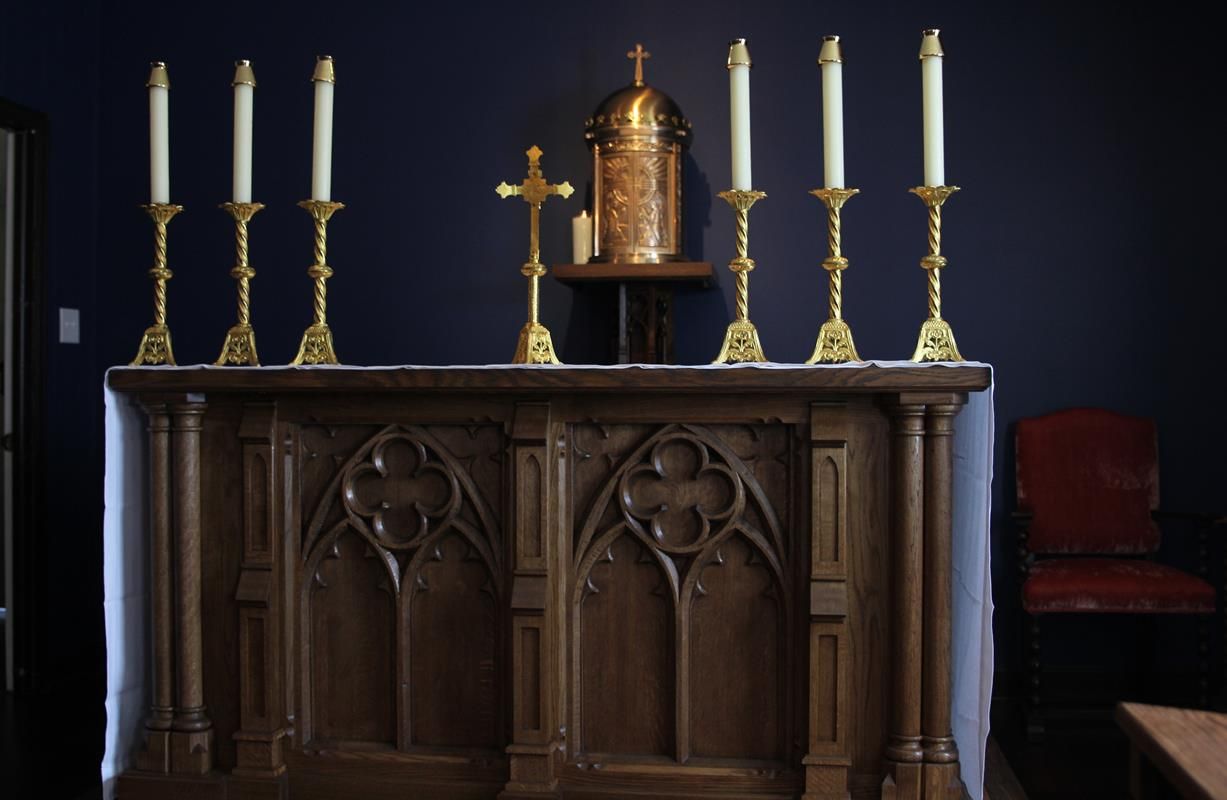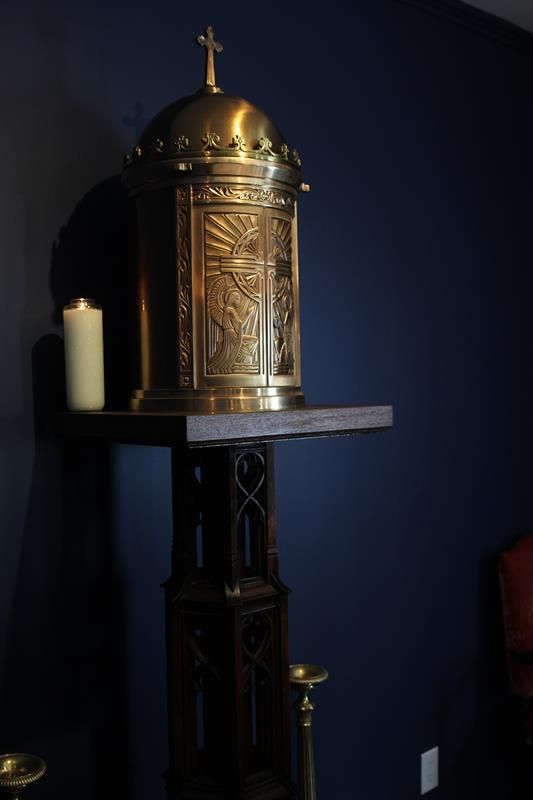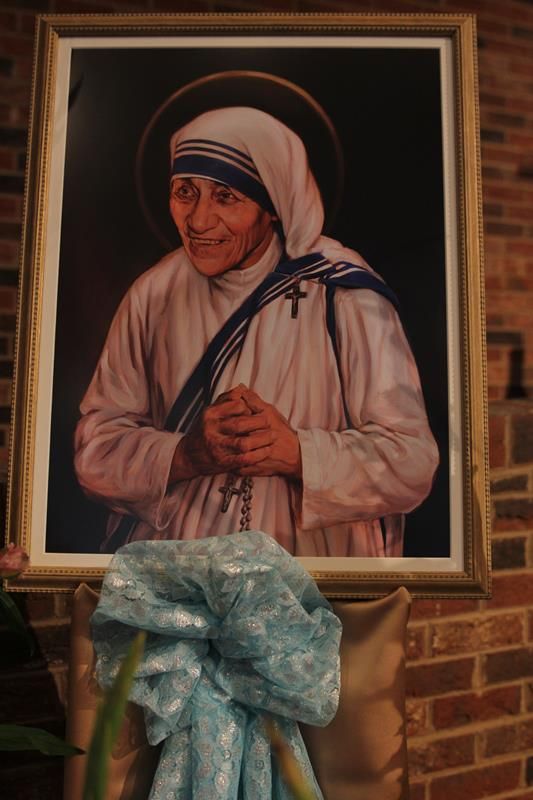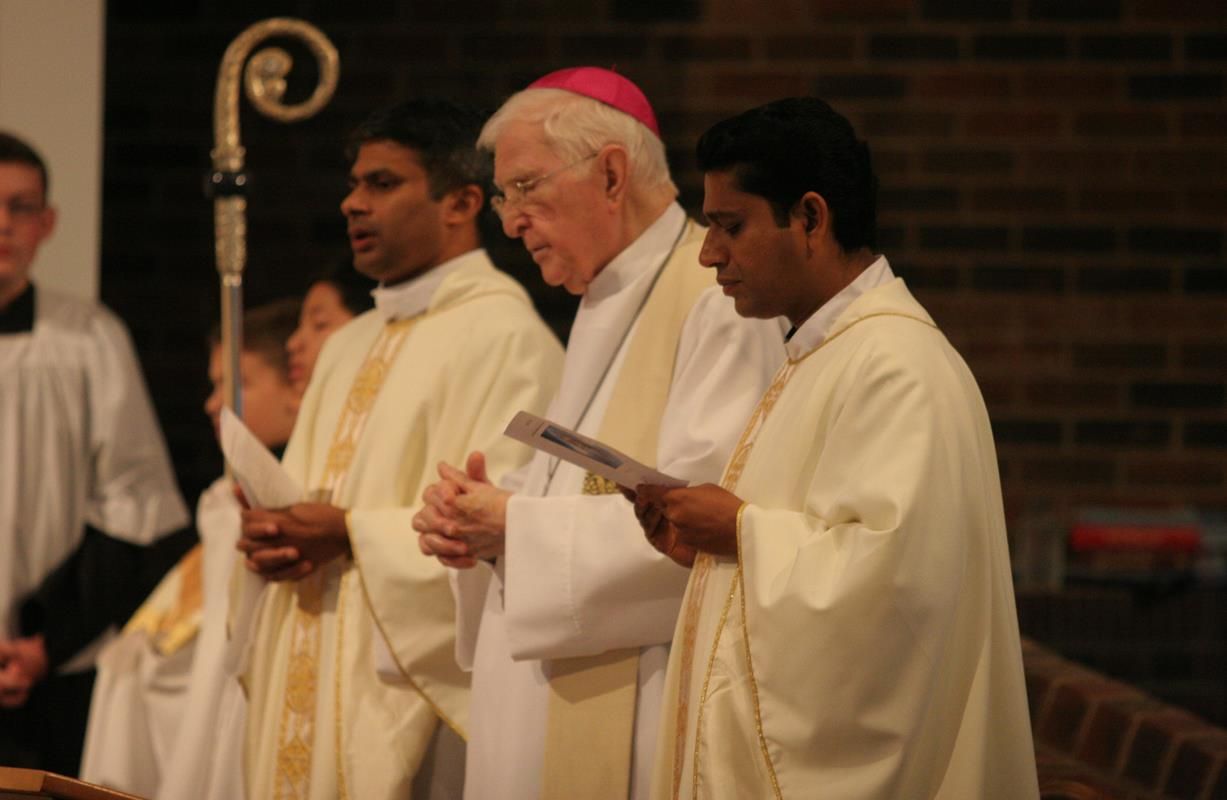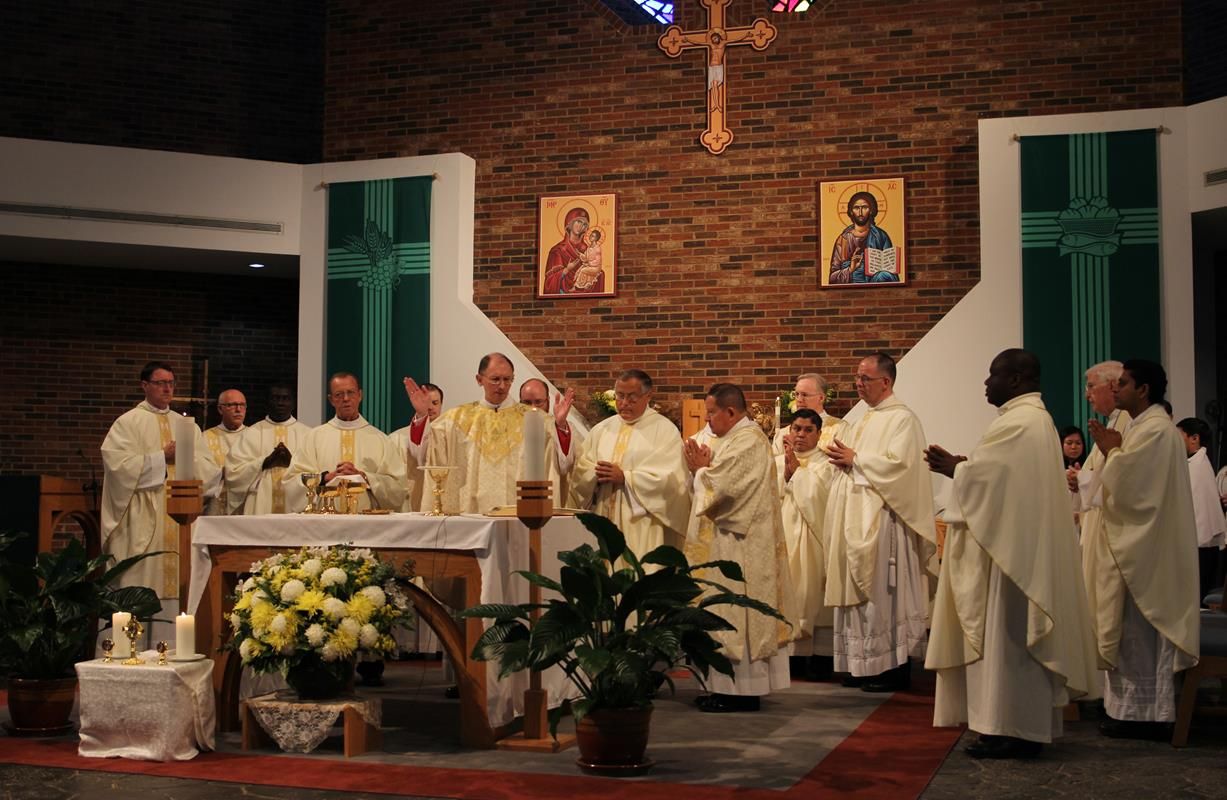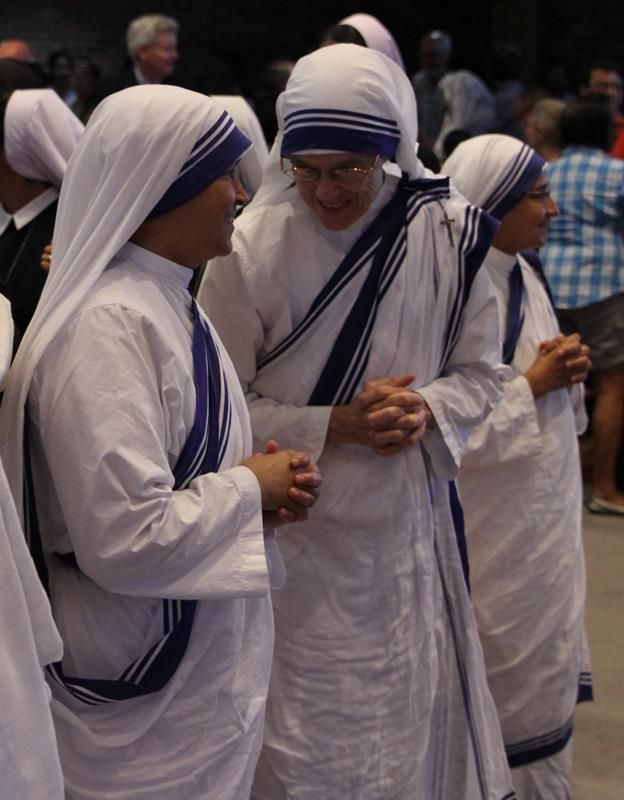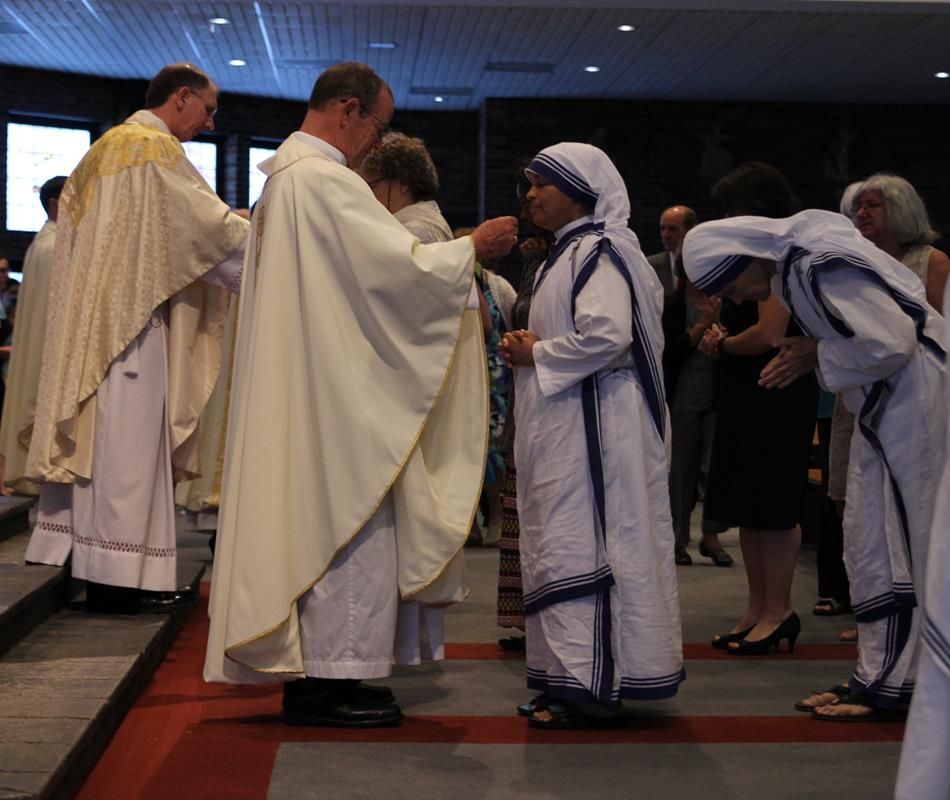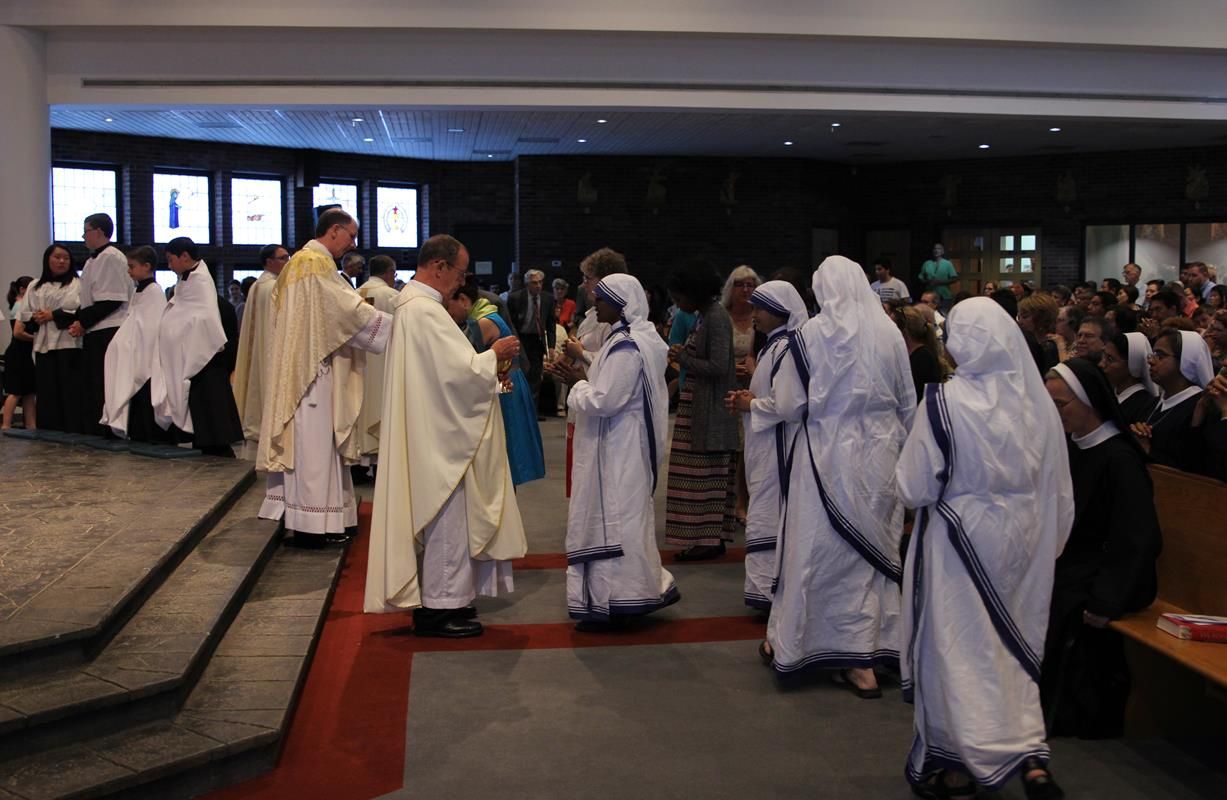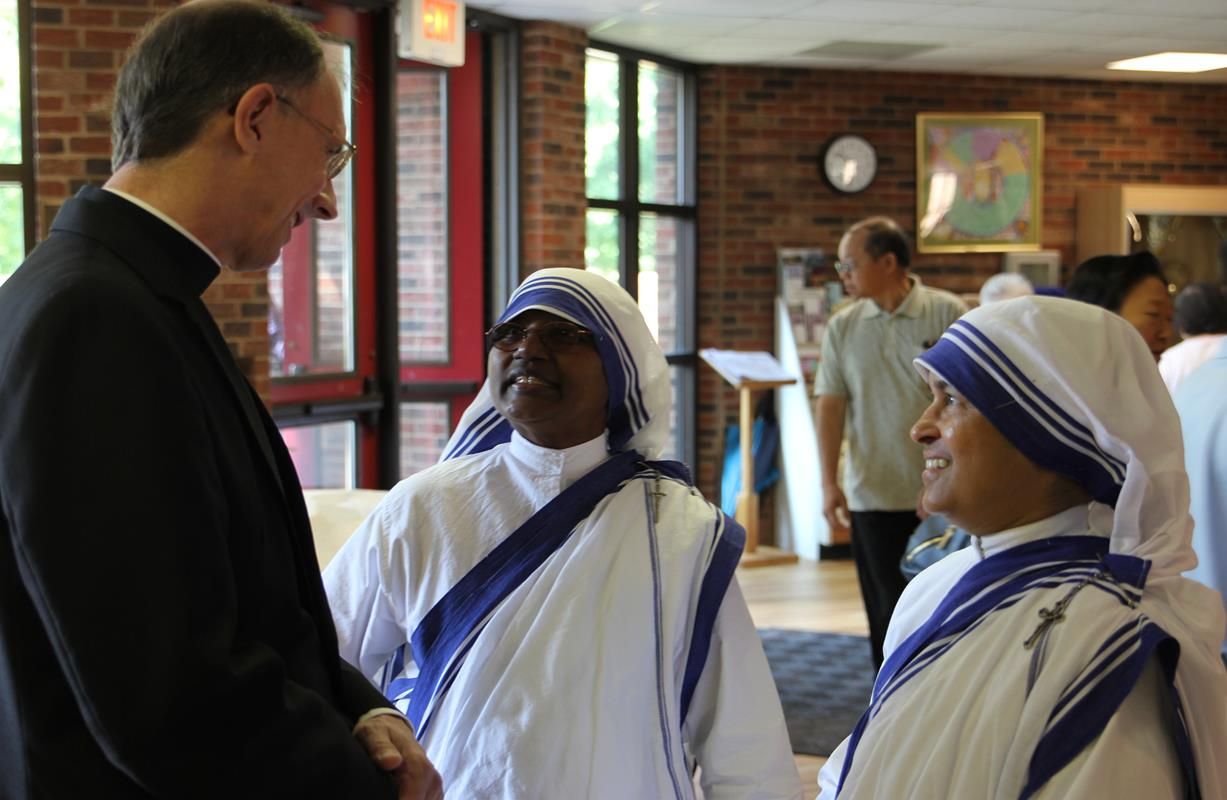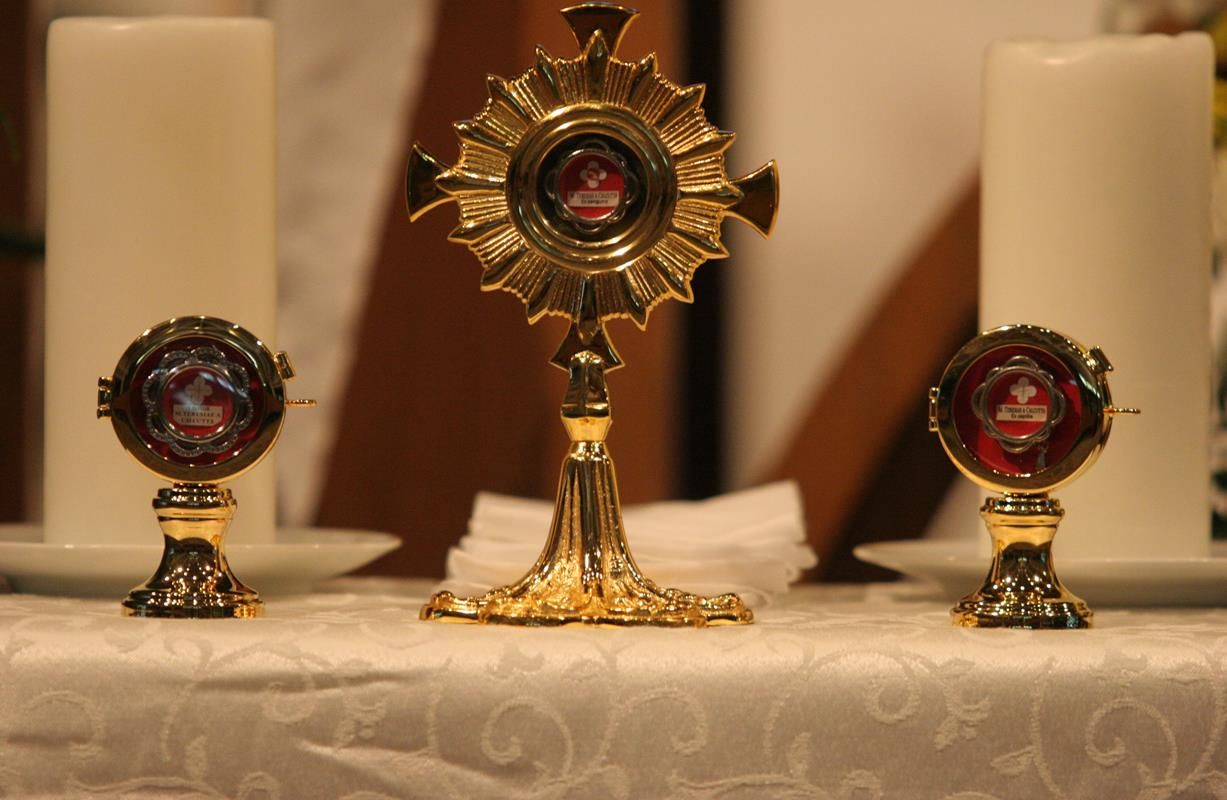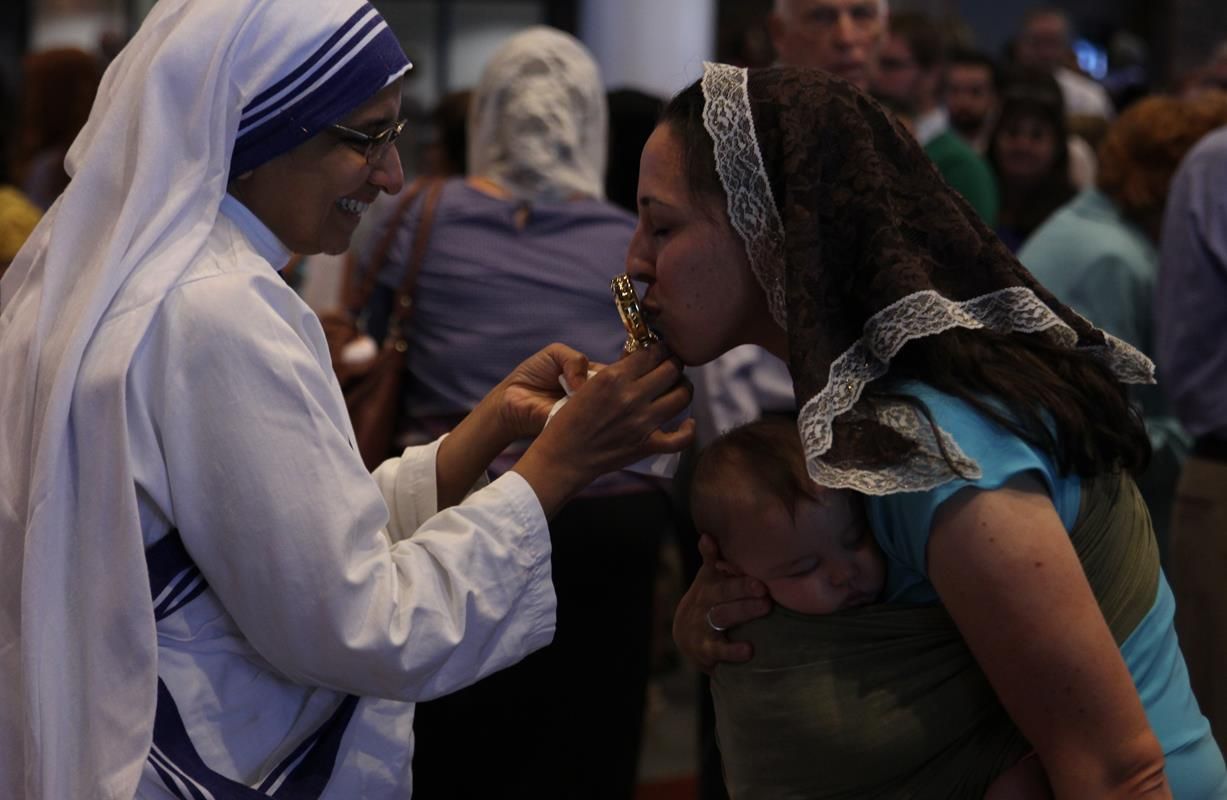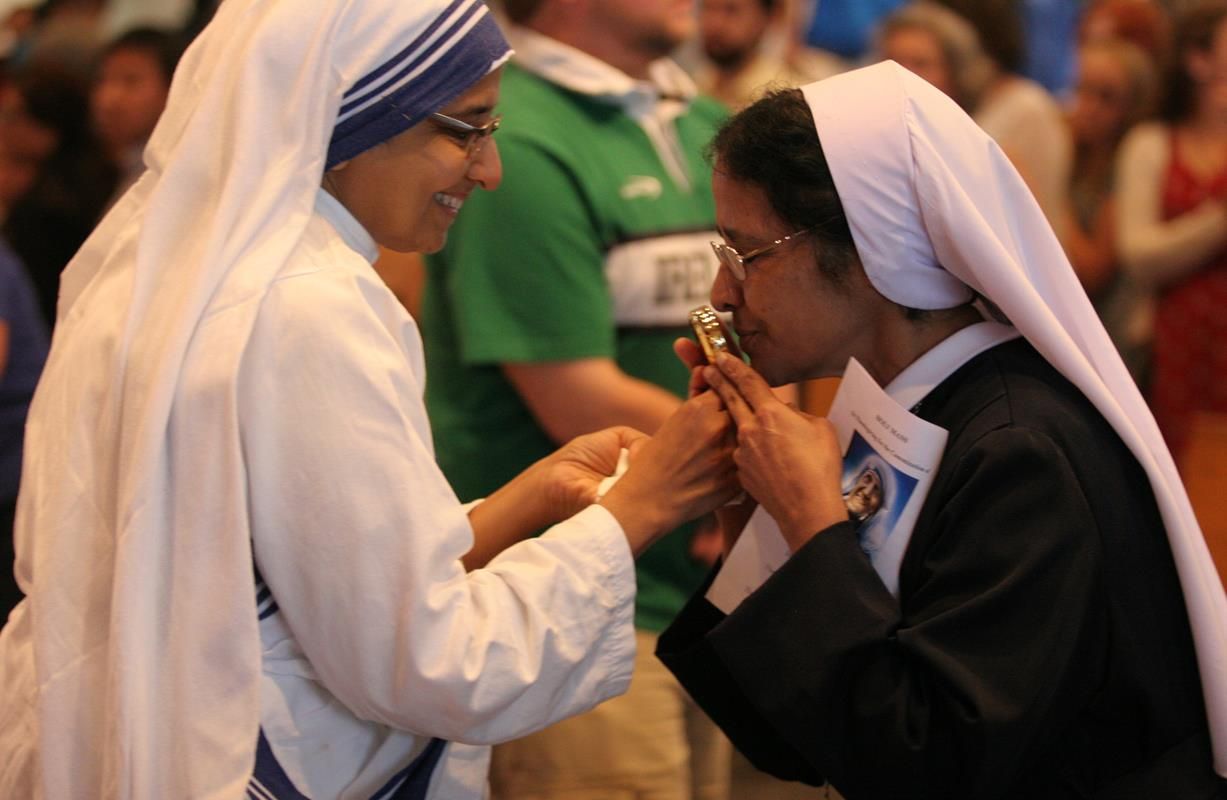
CHARLOTTE — One would be hard pressed to say whose smile was wider Aug. 15, as Bishop Jugis greeted the eight young men who comprise the first class at the St. Joseph College Seminary. As the men filed past Bishop Jugis into the refectory and saw their official cassocks neatly folded on the table, each with a nametag indicating its owner, everyone's smiles grew.
Bishop Jugis stood beside the table, savoring the moment, grinning as the men realized they were receiving their cassocks before the inaugural Mass in the seminary chapel. He offered prayers and sprinkled holy water over the garments the men will wear for official events. He then went around the table, reading each of their names and touching each of their cassocks.
All eight of the college seminarians had expressions of joy on their faces as they followed the instructions to don their cassocks in preparation for Mass. They met in the chapel once they were dressed, and prepared for Bishop Jugis to enter for the blessing of the chapel.
As they waited, Bishop Jugis went from room to room blessing the seminary, assisted by Father Matthew Kauth, rector. The two paused in the hallway before a crucifix that once graced the chapel in the Diocesan Pastoral Center, Father Kauth touching the Lord’s wounded feet as he moved past.
Once in the seminary chapel, Bishop Jugis blessed an 800-year-old crucifix that now hangs on the wall to the right of the altar. He offered special prayers for the men who will study and pray at St. Joseph College Seminary now and in the future.
After the blessing of the chapel, Bishop Jugis celebrated the inaugural Mass. Father Timothy Reid, pastor of St. Ann Church; Father Matthew Buettner, pastor of St. Michael the Archangel Church in Gastonia; and Father Kauth concelebrated the Mass. Father Noah Carter served as master of ceremonies and Father Jason Christian, parochial vicar of St. Thomas Aquinas Church in Charlotte, was in choir.
“As we are here to bless St. Joseph’s Seminary today, and on this feast day to give thanks and praise to almighty God for the very special privilege He bestowed upon the Blessed Virgin Mary in assuming her unto heaven, we are reminded by the readings that we have a destiny also to be with her one day in heaven,” Bishop Jugis said in his homily.
"The prayers remind us to keep our attention always fixed on the goal of our life, which is the glory of heaven, to be sharing with her – our sister in faith, our mother in faith – in the glory that the Lord bestowed on her.”
He explained that every one of us has a vocation from the Lord.
“The purpose of our life here is to serve the Lord faithfully in the vocation He has given us, so that we do arrive at that heavenly homeland He has prepared for us.”
Bishop Jugis also then addressed the inaugural class of college seminarians.
"As a seminarian, the Church gives you this time to pray and study, so that you don’t have to worry about a job and be distracted by many other things. It is a gift that the Church gives you," Bishop Jugis said to them. “In fact, your job now is to pray and to study, to deepen your spiritual life and to anchor yourself in Jesus.”
With the prayers of the Blessed Virgin Mary and with lives rooted in Jesus Christ, he continued, they will be strengthened in their faith -- especially during difficult times.
"Here we are at St. Joseph’s Seminary. This is Joseph's house,” he noted. “We proclaim him to be the patron of this house, the guardian and protector of this house. And just as he was the guardian and protector and provider of the holy house of Nazareth, and of the holy family, so we proclaim him to be the guardian and protector and provider of this house in Charlotte.
“And as in the house of Nazareth, Jesus was the center of attention. All the efforts of Blessed Joseph and the Blessed Mother were directed towards serving Jesus Christ. So in this house, also under Joseph’s patronage and direction, the center of attention is Jesus Christ.”
He then reminded the young men that the Blessed Mother is also with them.
“Wherever Jesus is, her destiny is always bound up with that of Jesus so she is also here with you in this home interceding for you, praying for you and accompanying you on your journey.”
During the Liturgy of the Eucharist, Bishop Jugis incensed the carved wooden altar made by North Carolina artist Jacob Wolfe which houses a relic of St. Teresa of Avila. He also reposed the Blessed Sacrament for the first time in the tabernacle after Holy Communion.
“Here in Joseph’s house, we are happy to be serving the Lord our God," Bishop Jugis told the eight students at the end of Mass. "I am proud of you."
"We pray that as the Mass for today reminds us to keep our eyes on things above, so that one day, when you finish faithfully your course of your life, you may arrive at the glory in heaven prepared for you and share in the Blessed Mother’s glory."
— SueAnn Howell, senior reporter
Learn more and contribute to St. Joseph College Seminary at http://www.charlotteseminaryproject.org/
 CHARLOTTE — Affordable summer camps can be hard to find. With that in mind, St. John Neumann Parish created a low-cost, faith-filled alternative offering four "tracks" for children to choose from this summer. For only $30 per child, the parish was able to host more than 130 children for the week of July 18-22, where they could enjoy arts, sports, drama and STEM (science, technology, engineering and math) activities.
CHARLOTTE — Affordable summer camps can be hard to find. With that in mind, St. John Neumann Parish created a low-cost, faith-filled alternative offering four "tracks" for children to choose from this summer. For only $30 per child, the parish was able to host more than 130 children for the week of July 18-22, where they could enjoy arts, sports, drama and STEM (science, technology, engineering and math) activities.
Sixty-five adult and teen volunteers helped run the weeklong camp. Christina Stevens served as the assistant camp director this year.
"This year's theme was Exodus, the story of Moses, and how God led His people to freedom," Stevens explained. "We started each day with a prayer and our theme song, 'Alive' by Hillsong Young and Free. After morning snack, we broke into our tracks for an hour and a half, focusing on different skills each session."
Campers made everything from prayer stones to stained glass windows, learned how to take pictures and put different textured pictures together to make a collage. Some learned how to run flag football plays, pass the ball and block, as well as the value of good sportsmanship and teamwork. STEM track campers learned about science each day, including chemistry, geology, physics and engineering, and flight and space. They had fun using everyday household items and food, such as graham crackers and marshmallow fluff, to explain plate tectonics. The theater track learned about blocking (finding your place on the stage), making props, setting the stage, and memorizing lines.
"Each day, lunch was sponsored by a different company or group, including our very own Knights of Columbus," Stevens said. "Once lunch was over, we split into two groups, rising first-fourth and rising fifth-eighth graders, for our one-hour devotional sessions, where we were able to focus more on the story of Moses and the surrounding themes of teamwork, faith and being set free. Our campers had the opportunity to put their faith into action in their afternoon tracks."
To bring the campers' attention back in, camp director Meg VanGoethem, and Stevens would say "SJN Summer Camp!" and the campers would respond "Let my people go!"
 Three campers at St. John Neumann Parish's Exodus-themed summer camp show off their creation. Photo provided by Christina Stevens)Campers ended the week by celebrating with an art exhibit, a STEM exhibit with their experiments, a theater performance of "The Prince of Egypt," and flag football games.
Three campers at St. John Neumann Parish's Exodus-themed summer camp show off their creation. Photo provided by Christina Stevens)Campers ended the week by celebrating with an art exhibit, a STEM exhibit with their experiments, a theater performance of "The Prince of Egypt," and flag football games.
Campers and volunteers also had the opportunity to share the new things they learned or ways that they saw God in each other throughout the week by writing them down in the "Book of Glory Stories and Good Things."
One camper wrote, "Since this is my last year as a camper at SJN Summer Camp, I wanted to say thank you to everyone for making camp awesome! I can't wait to come back next year and be a counselor!"
An adult volunteer wrote, "I am so excited to see so many teens involved in sharing their faith this week!"
Father Pat Hoare, pastor, celebrated Mass for the campers twice during the week, incorporating the Exodus theme into his homilies. Campers helped serve at the Mass and sing in the choir. They also participated in Eucharistic Adoration on the last day of camp.
Father Pat said the parish's long-term goal is to find a way to include more students so the parish can open the program to the surrounding community.
"I can think of no better way to introduce a family to the Catholic faith than through a fun, wholesome summer camp opportunity that taps into their God-given gifts and talents," he said. "And I am amazed, and humbled, by the gener-ous response of so many volunteers who lovingly share their artistic, athletic and intellectual skills with the next generation. God is so good!"
— SueAnn Howell, Senior reporter
‘This is the greatest event in the history of our society’
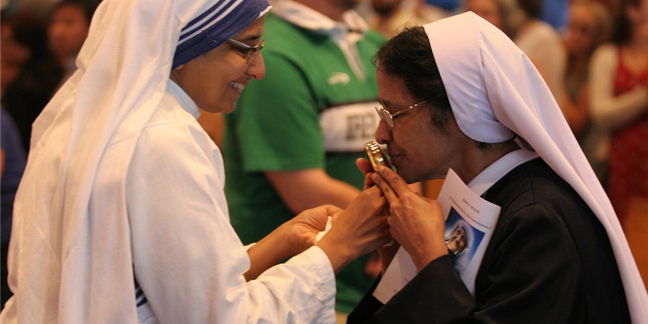 CHARLOTTE — Sister M. Shilanand, M.C., and the three other Charlotte Missionaries of Charity sisters were bursting with joy as they greeted hundreds of guests for Mass Sept. 5 at Our Lady of the Assumption Church to commemorate their beloved St. Teresa of Calcutta on her inaugural feast day as a saint of the Church.
CHARLOTTE — Sister M. Shilanand, M.C., and the three other Charlotte Missionaries of Charity sisters were bursting with joy as they greeted hundreds of guests for Mass Sept. 5 at Our Lady of the Assumption Church to commemorate their beloved St. Teresa of Calcutta on her inaugural feast day as a saint of the Church.
“For me personally and for the sisters, all of us here, this is the greatest event in the history of our society,” Sister Shilanand, superior of the Charlotte convent, said. “We are so grateful to God for what He was able to do through her and in her.”
Bishop Peter J. Jugis and Bishop Emeritus William G. Curlin were warmly received by the sisters as they entered the narthex to prepare for Mass. Bishop Curlin worked with St. Teresa of Calcutta to bring the Missionaries of Charity to Charlotte more than 20 years ago. He was a close friend, confidante and confessor of the newly proclaimed saint. He served as homilist at Mass.
Bishop Jugis, who celebrates Mass for the Missionaries of Charity in Charlotte as his schedule allows, served as the main celebrant. More than 13 priests concelebrated the Mass.
During his homily on St. Teresa of Calcutta, Bishop Curlin drew laughter and sympathetic nods from the standing-room-only congregation as he shared Mother Teresa’s wisdom and challenged those gathered to look inside themselves for answers to some of the issues that plague our world today.
“Mother Teresa certainly deserves a great and wonderful homily,” Bishop Curlin said. “If you don’t mind, I’d like to reminisce about the days I was privileged to be with her to share her friendship here on earth.”
He described their meeting when he was a young priest recently moved to the poor parish of St. Mary’s Church in Washington, D.C. His cardinal told him there was “a little sister from India” he wanted him to meet. Arrangements had been made for him to meet with her the following Tuesday, but Mother Teresa came to Mass at St. Matthew Cathedral the Sunday before which he celebrated and asked to speak with him then instead.
“I put her in my car and drove her to my parish. As we began talking, I kept running to the front door every hour or so. She asked me what I was doing. I said, ‘Mother, I make sandwiches at night and I stack them in the refrigerator and people come all day long… I said, ‘What else can you give?’ She said, ‘You give them your heart.’ That’s social action. You give them your heart.
“The more she talked about her way of serving and of loving people, especially those hurting, I thought, ‘This is certainly a holy woman.’”
Bishop Curlin described how their friendship grew as they exchanged notes and phone calls, discussing spiritual matters.
He drew laughter from the congregation when he relayed how Mother Teresa got him to India the first time.
“One day she said to me, ‘I’ll see you next Wednesday.’ I said, ‘Oh wonderful, you’re coming to Washington.’ She said, ‘You’re coming to India.’ I told her, ‘Mother, I work in Baltimore and can't come to India. She said, ‘You’ll come,’ and put the phone down. A priest friend paid my way and I thought, ‘Good heavens, she’s a dictator!’”
Bishop Curlin recalled the valuable life experiences he gained during his trips to see Mother Teresa and the sisters in India.
“Going to India was some of the happiest times in my life. I saw things there… Poverty, I knew poverty from my area (in D.C.) but I had never seen poverty like that. People lying in the streets with rats, people starving.
“The sisters were helping them. What an inspiration it was to me. What an education in Christianity.”
He had the experience of bathing lepers and blessing people who were dying whom the Missionaries of Charity had welcomed into their centers to die with dignity. During his time there, Mother Teresa encouraged him to look with his heart and see Jesus in those to whom he ministered.
“Is that the way we live our life?” Bishop Curlin asked. “Do we see Jesus all around us? In the people that we like or people who sometimes hurt us? Do we see Jesus in the face of that person? That was the secret, I think, of Mother’s great life.
“She believed that you are the living presence of Jesus. When you are feeding a poor, hungry man or are washing a leper, trying to reach out with love to them, those are Christ’s hands. When you speak with kindness and forgiveness and understanding, you echo His heart. When you look at someone, you look with the kindness of Jesus.
“Or do we just say, ’I go to church and I’ve done my duty?’”
Bishop Curlin said Mother Teresa challenged him with the idea of rising above and really helping people, to see that it was Christ really trying to help people. “Do you really believe that Christ lives in us?” he similarly challenged those gathered.
He shared that he cherishes the memory of all the times he and Mother Teresa met and their spiritual conversations over the years. “Each time I went there, I realized I received more and more than I was able to offer that saint.”
Sister Shilanand said that Mother Teresa was specific about how she would help others if she were to become a saint.
“I remember what she said: ‘If I will be a saint, I will be one of darkness. I will be continually absent from heaven because I want to help. I want to come back to light the light of those who live in darkness.’
“My message to all of us is that we ask for her intercession. She has promised she will come to help us.”
— SueAnn Howell, senior reporter
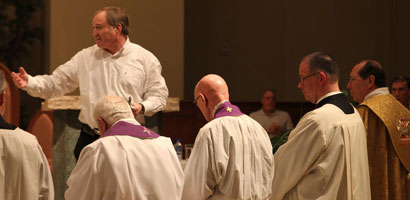 'In every moment, Jesus is calling out, 'I love you''
'In every moment, Jesus is calling out, 'I love you''
HUNTERSVILLE — They came in quietly, prayerfully, slipping into the pews at St. Mark Church before the 6:30 p.m. healing Mass and prayer service Nov. 5. Some were in wheelchairs, some using canes and walkers, some bearing the physical signs of a battle with serious illnesses such as cancer.
All came to pray, to silently ask God for help in the exterior and interior struggles in their lives and to be blessed by Alan Ames, a layman who travels the world sharing his powerful conversion story and his gift of healing.
During his homily at Mass, Father John Putnam, pastor, said that inevitably whenever the Church hosts an event like this there are questions like, "Is all this Catholic?"
"My normal response is of course, and this is why," Father Putnam explained. "When we look at the life and the ministry of Jesus, what we see is the Lord leading a life in turn for people – His desire to be with people in their infirmities, in their troubles, in their hopes and in their dreams. In a special way He was conscious of those who were suffering, as we see in the Gospel."
Father Putnam stressed that the Church is concerned about everything Jesus said and did because it is to the Church that He has entrusted carrying on His Presence, His preaching and His ministry in the world today.
"Jesus desires to strengthen His people. Jesus desires to enter our hearts, our minds and our spirits. Jesus invites us to a closer walk with Him," he said. There are many examples of this in the scriptures, he noted, including the story recounted in the Gospel reading at Mass, in which the woman who had been hemorrhaging for 12 years touches Jesus' garment and was healed.
Father Putnam also referenced the first reading about Elijah being strengthened for his 40-day walk in the desert. The angel appeared to Elijah and gave him a cake and water to sustain him on his journey.
"Obviously, that was no ordinary cake," Father Putnam joked. "The scriptures give us an image of what is coming... an image of the Eucharist, of the Lord Himself who nourishes us with His very life, His Body, Blood, Soul and Divinity."
We are all invited to do much more than touch the hem of Jesus' garment, Father Putnam said. We're invited to receive Him, to become temples of the Holy Spirit.
"Alan is the first one to tell you that it is Jesus who heals, Jesus who works through His Church. Through the priest at the altar, the priest who sits in the confessional, who stands beside the sickbed. It is the priest, obviously, in the Lord Jesus, but it is the Lord who heals in confession and the Eucharist and who forgives all sins."
"Jesus who wants to be with us, to nourish us and to show us the way to His Father."
After Mass, Ames spoke to the faithful, sharing the personal testimony of his conversion and how his life changed in 1993 when he realized how the sins of his former lifestyle had hurt God. He also came to realize that Jesus offered him forgiveness from the cross.
Ames recounted that after some struggles, he accepted the forgiveness offered by Jesus. He shared that the Lord helped him to come back to the sacraments and to the Church and changed his hatred and pain into love. And he explained how later God called him to be one of His witnesses, sent to carry God's love into the world.
"When I was 40, Jesus appeared to me (in a vision) and filled me with His Divine Love and told me He loved me," Ames said.
He believes it is because of the prayers of the faithful who pray to God for healing of those with addictions and who have strayed from the Church that He was saved and received the gifts of healing from God.
"It is because of your prayers, people like you, that God saved me. I thank you all for that and encourage you to never stop praying."
Ames explained that he never wants to lose God's love, now that he has had intimate encounters with Him in prayer.
"Many people have forgotten how God loves us... There is nothing to fear in God. He's tender, loving... He's near us! Not far away. Jesus is near us, right next to us."
Ames noted that to God, every person is a treasure, a jewel. God is in love with each one of us.
"In every moment, Jesus is calling out 'I love you!' He wants every one of you to be incredible, to be saints of this time... Jesus wants the best for you. He knows we have faults. He doesn't expect you to do it by yourself."
We need to ask the Holy Spirit every day to help us, Ames stressed. The first prayer he prays every morning is to the Holy Spirit, asking for His intercession in his daily life.
"Now when I fall down, the Holy Spirit is there. He lifts me up and gives me the strength to carry the crosses... God just wants you to ask for it (the Holy Spirit), to accept it. (Life) won't always be easy, but we'll have the strength to persevere."
Ames also spoke about the Blessed Virgin Mary and how she intercedes for us and always brings us closer to Jesus. He has also received visions of her and how she works to bring us healing and help us come to know and love Jesus.
"Jesus can't refuse His Mother's requests to help us."
He explained that when we come to Mass, we must come in love and that Jesus is waiting for us at every Holy Mass.
"We should come as empty vessels to holy Mass. Jesus is saying, 'I love you,' and we should respond in love. When you do, Jesus draws your humanity into His Divinity. He empties Himself completely so we can be one in Him in the Holy Eucharist.
"That's what we're meant to do, to change, to be more and more like Jesus," Ames stressed.
"Put all your crosses, family, etc., in the chalice as it is lifted (during Mass). Then you and your intentions will be raised to heaven and the Father."
He also encouraged people to bring with them in prayer and in their hearts their loved ones who needed healing as they approached the sanctuary steps during the healing service, which followed the Mass.
Hundreds of people filed up to the steps of the sanctuary during Adoration to ask for healing. Ames made the sign of the cross on their foreheads and prayed over them. Some were overcome by the Holy Spirit and were gently laid on the floor by volunteers for the brief moment they were resting in the spirit. Others walked away from the blessing clutching photos of loved ones with a look of serenity on their faces and, for some, tears in their eyes.
Father Putnam said he was very happy to have Ames visit the parish. "His message is clear and simple and impacts people in a meaningful way. We all need some type of healing, and it was a wonderful opportunity to let the Great Physician minister to His flock," Putnam said.
In his closing remarks, Ames shared that in his visions he saw that in heaven there is only love, forever.
"Heaven is what this life leads you to, if you believe and trust in God."
For more information about Ames and his healing ministry, or to order his books, go to www.alanames.org/en.
— SueAnn Howell, senior reporter
Hundreds of young people from across the Diocese of Charlotte have recently received the sacrament of confirmation. Deo gratias!




